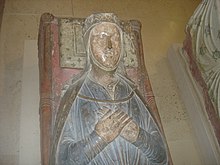Isabella, Countess of Angoulême
| Isabella of Angoulême | |
|---|---|
 |
|
| Queen consort of England | |
| Tenure | 24 August 1200 – 19 October 1216 |
| Coronation | 8 October 1200 |
| Countess of Angoulême | |
| Tenure | 16 June 1202 – 4 June 1246 |
| Predecessor | Aymer |
| Successor | Hugh I |
| Born | c. 1186 |
| Died |
4 June 1246 (aged c. 60) Fontevraud Abbey, France |
| Burial | Fontevraud Abbey |
| Spouse |
John, King of England Hugh X of Lusignan |
| Issue more... |
Henry III, King of England Richard, 1st Earl of Cornwall Joan, Queen of Scotland Isabella, Holy Roman Empress Eleanor, Countess of Pembroke Hugh XI of Lusignan Aymer de Valence Alice, Countess of Surrey William, Earl of Pembroke Isabella of Lusignan |
| House | Taillefer |
| Father | Aymer, Count of Angoulême |
| Mother | Alice of Courtenay |
Isabella of Angoulême (French: Isabelle d'Angoulême, IPA: [izabɛl dɑ̃ɡulɛm]; c. 1186 – 4 June 1246) was queen consort of England as the second wife of King John from 1200 until John's death in 1216. She was also suo jure Countess of Angoulême from 1202 until 1246.
She had five children by the king, including his heir, later Henry III. In 1220, Isabella married Hugh X of Lusignan, Count of La Marche, by whom she had another nine children.
Some of her contemporaries, as well as later writers, claim that Isabella formed a conspiracy against King Louis IX of France in 1241, after being publicly snubbed by his mother, Blanche of Castile, for whom she had a deep-seated hatred. In 1244, after the plot had failed, Isabella was accused of attempting to poison the king. To avoid arrest, she sought refuge in Fontevraud Abbey, where she died two years later, but none of this can be confirmed.
She was the only daughter and heir of Aymer Taillefer, Count of Angoulême, by Alice of Courtenay, who was sister of Peter II of Courtenay, Latin Emperor of Constantinople and granddaughter of King Louis VI of France.
Isabella became Countess of Angoulême in her own right on 16 June 1202, by which time she was already queen of England. Her marriage to King John took place on 24 August 1200, in Angoulême, a year after he annulled his first marriage to Isabel of Gloucester. She was crowned queen in an elaborate ceremony on 8 October at Westminster Abbey in London. Isabella was originally betrothed to Hugh IX le Brun, Count of Lusignan, son of the Count of La Marche. As a result of John's temerity in taking her as his second wife, King Philip II of France confiscated all of their French lands, and armed conflict ensued.
...
Wikipedia
